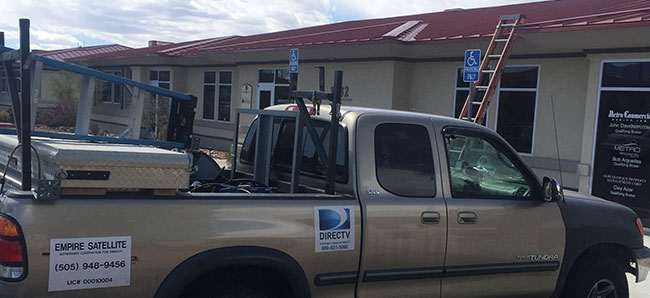Have you seen the small businesses getting sued thanks to questionable DirectTV Practices? We have. Unfortunately, it is indicative of a far greater issue facing small businesses.
Case Study
It goes something like this: You own a business. You decide to order DirectTV and schedule an installation. On the scheduled day, the truck pictured arrives to install your service. Since you are not a DirectTV savant, you rely on the expertise of the installer. He or she says that a residential service would be best for you, and you agree. You both go on your way.
What could possibly go wrong? A lot.
Small Business Scam
If recent lawsuits are any indicator, relying on the word of the installer can open your business to a world of legal trouble. Remember when we asked what could go wrong? Here’s what could go wrong:
- The installer might be a representative of DirectTV, or they might be a subcontractor. This means you cannot rely on what the installer tells you.
- The fine print in that DirectTV residential service contract you didn’t read says you agree to only use the service in your home. It also limits your legal options to sue DirectTV.
- By doing this, you just violated federal law. Specifically, The Cable Communications Policy Act, which prevents anyone from “assist[ing] in intercepting or receiving” cable communications for unauthorized viewers. In other words, a business is violating federal law if it pays for residential service. This federal law includes significant penalties.
- DirectTV lawyers are suing businesses that have residential service. Read DirecTV makes money in a questionable way published by the Dallas Morning News.
Why Don’t the Words or Promises of the Installer Count?
By now, if you’re like most business leaders, you’re working whether you can shift the blame to the installer. The short answer is no. Why?
- The installer is not an attorney and does not know the intricacies of the DirectTV contract.
- Your reliance on the installer doesn’t help you with the violation of federal law.
- Have you heard of the Parol Evidence Rule in Contract law? In short, contracts may not be contradicted by other evidence. Whatever the installer may say, it only counts if it is in writing.
A Lesson for All Businesses
The obvious lesson here is to make sure that your business accounts are in order. Make sure your business has the proper commercial accounts for your needs.
But, there is a much deeper lesson here. Troubling as DirectTV practices are, they are not uncommon. As a business leader, you have to CYA (Cover Your Assets). Understand what you are signing! Make sure that your contracts make provisions for potential issues. Remember that unless something is in writing, it is almost impossible to enforce, and similarly, verbal promises made are very hard to enforce if a written contract contradicts those verbal promises.
While it would be silly to assume that everyone is out to scam your business, it pays to to be vigilant. When using a vendor or subcontractor, do your research. Make sure you can rely on the company.
Law 4 Small Business, P.C. (L4SB). A little law now can save a lot later.

